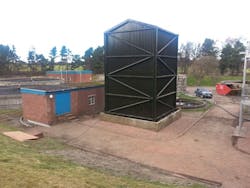About the author: Peter Brewer is general manager of ACWA Services. Brewer can be reached at [email protected] or +44 1756 794794.
Twelve miles east of Edinburgh in the middle of the prime barley-growing areas of Southern Scotland is the Pencaitland maltings plant. Pencaitland is one of five plants operated by U.K. maltster, Bairds Malt. With an annual malt production capacity of 47,000 tons, the majority of which are destined for the distilling industry, the Pencaitland maltings plant uses significant quantities of water in the steeping and germination processes. Its existing biofilters had reached the end of their useful life and a new biofiltration solution was needed. Given its scenic location, it was particularly important for the new plant to minimize its environmental impact in terms of a compact footprint, low noise and minimal energy requirements.
This was to be a major project, which included the decommissioning and demolition of the existing biofilters and the design, supply, installation and commissioning of a new biofiltration plant. Filters on the four other sites would be replaced in due course.
ACWA Services, part of the ACWA Group, an international water and wastewater solutions provider, was selected to act as main contractor and principal contractor for all aspects of Baird’s project. The benefits of this structure included detailed process and product knowledge and experience, maintenance of quality standards, and a short chain of command. The new biofiltration plant was completed within eight months, becoming operational in April 2015. It was not without its challenges, however.
Ensuring the Pencaitland plant remained fully operational while the wastewater biofilters were replaced was a key objective. This was achieved by installing a temporary Submerged Aerated Filter (SAF) unit to operate in parallel with the existing biofilters to enable each one to be demolished and rebuilt. The biofilters had to be demolished carefully as live equipment was immediately adjacent to them. In addition, the existing concrete bases were being reused, so any damage during demolition had to be minimized.
The first biofilter was not released for demolition until it was established that the SAF was working satisfactorily. This was established by sampling the wastewater into the SAF and the treated wastewater out of the SAF to check the percentage of biological oxygen demand (BOD) removal. The new biofilter was brought online gradually by introducing wastewater slowly and increasing it incrementally up to full flow. Again, influent and treated effluent were monitored to ensure the correct percentage of BOD removal was being achieved. The same process was adopted for the second, identical biofilter.
Both biofilters have a rigid structured plastic media designed to offer a high specific surface area and good air and water distribution. Wastewater is distributed over the media by a series of nozzles above the media that distribute the wastewater over the media surface. A proportion of the wastewater is recirculated by pumps through the media to guarantee a minimum volume passing over the media (at times of low influent flow) to ensure the biofilm is kept moist and the micro-organisms remain healthy.
Today, the new system plays a key role in reducing the pollutant load in wastewater discharged from production processes. The system was designed to reduce the plant’s BOD load by more than 90%, and this has directly reduced its trade discharge BOD concentration. The plant’s flow is 550 cu meters per day, with a BOD load of 100 kg per day. Now, with the new biofilters operating at full capacity, the treated effluent BOD is less than 10 kg per day.
Baird’s wastewater treatment plant is energy-efficient and robust, with low operational and maintenance requirements. The circulation pumps require servicing once a year, and the plant is expected to have an operational life of at least 20 years.
“Wastewater biofiltration solutions to reduce trade effluent loads from production processes are crucial to a range of industries to minimize their environmental impact, ensure compliance and reduce costs,” said Peter Brewer, ACWA Services’ U.K. general manager. “With a growing range of wastewater treatment solutions to choose from, combined with changing water industry directives, it is important to select the right engineering partner to deliver durable, future-proof solutions.”
“The ACWA team was very professional in its approach to the demolition of the existing biofilters and the construction of the new units and paid particular attention to all [health and safety] issues,” said Richard Broadbent, production and technical director. “The technology design was robust, utilizing corrosion-resistant materials designed to last. We now have an upgraded wastewater system which performs well under a variety of flow and load conditions.”
Download: Here
